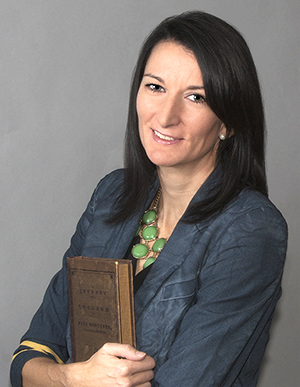Stacy Lockerbie earned her PhD in anthropology from McMaster University in 2014. She is currently a research associate in the department of family medicine at the University of Calgary. Find her online at and follow her on Twitter @Stacy_Sparkles.
 What did you hope for in terms of employment as you completed your PhD?
What did you hope for in terms of employment as you completed your PhD?
I did not intend to pursue academics and the elusive tenure track position. After I finished my PhD, I was encouraged by a former classmate to move to Calgary and work in the Cumming School of Medicine.
What was your first post-PhD job?
I took a research coordinator position in community health science with one of the most respected researchers in the field. This experience leveraged me and I was quickly recruited into family medicine to do postdoctoral research. I worked with two inner-city physicians on research with vulnerable youth and teen pregnancy with street affected populations. Family medicine is a great fit for my interests and skill set.
What do you do now?
I am currently in another research coordinator position. We are doing inner city research with street affected and addicted populations. This is a completely new field of research and it excites me. Taking a research coordinator position has created a space for me to build collegial respect, help those in health care to understand my field and methodology and to gain footing to launch into other roles.
What most surprises you about your job?
As an anthropologist, I would never have access to the hospital in such ways. Working with physicians provided me with a chance to attend daily rounds (I had to look up terms on my phone in order to follow along), read patient charts and visit patients bedside, or recruit participants from the Emergency room. I would never have this kind of experience without institutional support of the department of family medicine.
What are your favourite parts of your job?
In this role I have also had such a valuable opportunity to build my social capital and expand my skill set. I have made valuable connections in the academy and in the community. I have also learned new terminology, data handling methodologies and conducting systematic literature views. My responsibilities in this role have grown to suit my strengths and I play a key role in the process evaluation and knowledge translation components of the research. I have also had the opportunity to mentor junior colleagues and work in a team environment. It’s a big change from the isolation of graduate school. I have had the incredible opportunity to connect with amazing mentors who have been integral in supporting me to reach my goals.
I was tired and burnt out after graduate school; however, working in medicine has revived my passion for research. Although I am happy working outside of anthropology, I am grateful for the tool kit anthropology has supplied me. Throughout my academic pursuits for the Masters and the PhD, I have worked extensively on research overseas and have gained the tacit knowledge and patience about relationship building and connecting to people from different backgrounds. I feel like I have a unique voice that compliments that of physicians. Qualitative research, ethnography in particular, is such an incredible tool for applied health sciences to elicit rich qualitative data towards solution-orientated strategies for improving primary care in vulnerable populations. I spent several years studying the global, now is my chance to study the global in a local setting. Calgary is a unique city, indeed a nexus of global activity. I have made my home here and I am excited to immerse myself into research in our local context.
What’s next for you, career-wise?
Even though I did not want a tenure-track position when I started, my varied experiences in this department have really made it clear that the tenure track professor job is what I seek and aspire to.
What advice or thoughts do you have for post-PhDs in transition now?
I recommend for new PhDs to take these research positions rather than sessional teaching. We all need to pay our bills, but at least this route provides a chance to get your hands dirty and produce some outputs.
